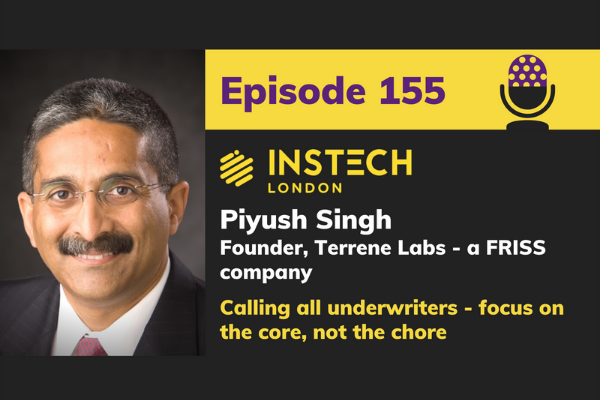For underwriters, time spent searching for information is time lost to underwriting.
Terrene Labs, acquired by FRISS in April 2021, aggregates third-party data sources to help underwriters focus on the core of underwriting rather than the chore of data collection. The acquisition will expand FRISS’s range of underwriting insights beyond risk detection analytics.
Matthew speaks to Piyush Singh, CEO of Terrene Labs, on podcast 155 to discuss why he left his senior role to launch a start-up, how Terrene Labs built its client base and why his business was acquired by FRISS.
Listen now to learn about:
- The importance of classifying businesses accurately
- How to find out a lot about a company from just four questions
- How the insurer can become an expert advisor to its customers
- The unusual data that can impact risk pricing that insurers don’t usually look at
- The opportunities in small commercial lines insurance in the US
If you like what you’re hearing, please leave us a review on whichever platform you use, or contact Matthew Grant on LinkedIn.
Sign up to our newsletter for a fresh view on the world every Wednesday morning.
For more information on FRISS, go to friss.com
Continuing Professional Development
InsTech London is accredited by The Chartered Insurance Institute (CII). By listening to an InsTech London podcast, or reading the accompanying transcript, you can claim up to 0.5 CPD hours towards the CII member CPD scheme.
The Learning Objectives for this podcast are:
- Realise how technology sales can happen in insurance and how this has changed in the pandemic
- Understand how businesses can be categorised and what happens with the data
- Recognise how data collection can be automated and the hurdles to overcome
To continue learning about the essential data for underwriters, read our insight 50 free insurance data sets you’ll need.
Let us know you have listened to this podcast and if your organisation is a member of InsTech London you will receive a quarterly summary of the CPD hours you have earned.
To help us measure the impact of the learning, we would be grateful if you would take a minute to complete a quick feedback survey.
Calling all underwriters – focus on the core, not the chore – Episode 155 highlights
Matthew: Piyush, you founded Terrene Labs about five years ago, which was acquired by FRISS in April. What motivated you to start the company?
Piyush: I had been the Chief Information Officer (CIO) of Great American Insurance; before that, I worked at RLI. I was following how the industry was evolving, and I had been involved in a few start-ups.
The $100 billion small commercial market space was being ignored. No one was addressing it. I was trying to change that. As CIO, I did not want to do one more policy system administration implementation. I needed to get out and make an impact on an industry level.
Matthew: What did Terrene Labs set out to do?
Piyush: While small businesses have become more tech-savvy in the last ten years in their interactions with banks and credit, the insurance market is far behind. Our first idea was to simplify the customer experience. Then we focused on enriching customers’ data with third-party information to help insurers understand the risk better.
Matthew: How do you provide this to clients?
Piyush: Insurers or brokers sometimes ask hundreds of questions on an agent portal to get a quote. We have simplified the front end to ask for four fields: name, address, phone number and website. Our data aggregation engine classifies the business and collects data from thousands of sources to help the underwriter understand the risk. Then we sieve it according to each insurer’s risk appetite.
Matthew: How can you extract so much information about a business from their website?
Piyush: Classifying the business correctly determines the coverage offered and the exclusions in the policy. We investigate not only a company’s website but also social media, licensing and other third-party information to truly understand the business. These multiple sources are vital as many businesses do several kinds of work and several have pivoted during the COVID crisis. A pizza outlet in Chicago made masks during COVID. Its insurer cannot underwrite it as just a pizzeria, it needs to know it is manufacturing medical equipment. There are only so many ways you can ask these questions of a business; it is easier for us to classify it appropriately.
Matthew: Does the insurer or broker then tell the client how and why they are classified?
Piyush: In our system, all information is made available to the agent or insured, and the insured signs off on it. That way the insurer understands the risk and the insured knows the coverage it needs to buy. If the insured does not understand the coverage it needs, the business could fail, for example, if it was sued for a faulty mask and had no coverage.
Matthew: Does that mean the insurer can help the business with its own risk management?
Piyush: Yes, the insurer becomes an expert advisor to the agent or insured. It means institutionalising the knowledge that is spread across individual underwriters and allowing them to focus on underwriting rather than data collection.
Matthew: How much of this can be automated?
Piyush: For small commercial, the goal is to get as much business through straight-through processing as possible.
Our role is to enrich the underwriting platform and automate as much of the business as we can. We provide information to underwriters, so they do not have to figure it out themselves. If an underwriter works on an $800-$1,200 policy for an hour, the insurer has lost money already. Some sections may still need to be referred to an underwriter but most of it should go straight-through.
Matthew: How hard is it to do this?
Piyush: The world’s data is available. The challenge is building the expertise to search effectively for the data you need and get as few false positives as possible.
Matthew: What interesting examples of revealing data have you discovered?
Piyush: Insurers typically ask contractors what US state they are based in. We found a contractor in Iowa and examined the permits, which insurers never look at, showing 95% of his permits were issued in California. The contractor is paying Iowa rates to do business in California, which is a highly litigious state.
When we sifted through social media for a restaurant, we found a mention of shots – not drinking shots, but shots being fired. We looked through another restaurant’s health inspection report and found live mice were mentioned. These are never part of the questionnaire in an insurance application, but they impact the underwriting decisions and pricing of the risk.
Matthew: What clients are you working with?
Piyush: We have national insurers, Super Regionals and state-based insurers. One of our clients writes $10 billion of premium, another writes $5 billion and so on.
Matthew: How do you demonstrate to potential clients the value of your work?
Piyush: We do a proof of concept with clients. We take 100 to 500 risks on a particular industry segment, run it against our engine and show the client what is possible.
The underwriting team can change their focus from collecting data on each risk to choosing what data they want and deciding which variables we provide will add value to underwriting or pricing.
Matthew: FRISS works in fraud detection for underwriting and claims. How did you come across FRISS, and what was the motivation for the acquisition?
Piyush: We grew almost 140% over 2020, and we wanted to continue to scale up. Our mission, getting underwriters to focus on the core, not the chore, was aligned with Jeroen and Christian at FRISS. Several conversations later, we decided to be acquired by FRISS.
Our product is a complementary solution to theirs. We were focused on the US market only, and North America is an area of growth for FRISS. Together we expect to have a larger impact in the long run by bringing the underwriting and claim side together using data.
Matthew: Traditionally, technology sales to insurance were driven by in-person interactions, but you have grown through Covid. Has the way insurance technology is being sold changed?
Piyush: It is important to convey the value proposition and find leaders who understand the value and have the vision to drive their company’s agenda.
Small commercial in the US is a fragmented market. The top five players make up just 26% of the total market; none is larger than 6%. What we provide can help the smallest insurer compete with the bigger ones, because the agent or insured is looking for ease of use.
Matthew: You came out of a CIO role to build a business you had to sell. What advice would you give other founders trying to grow their business?
Piyush: Running a start-up is a different ballgame from running an established business. We have made mistakes and had successes. What we have done well is being honest to our clients about our capabilities.
My previous roles were not sales roles. But leaders are always selling a vision, even internally, and bringing in a team to execute that vision.
Matthew: Who is your typical buyer within a company?
Piyush: We mostly sell to the Chief Underwriting Officer or small business division head. Leaders trying to build the industry of the future who feel that technology will give their company the edge to compete with bigger companies.
Matthew: Is there anything else you would like to share?
Piyush: Underwriting is going through a transformation in small commercial lines. While the news is swamped by personal auto and homeowners’, small commercial is the next battlefront for insurance companies. The winners will be the companies that leverage data and insights. While they all have their own underwriting appetites and pricing matrices, the differentiating factor will be letting the underwriters focus on the core of underwriting rather than the chore of collecting data.
Matthew: How should people contact you or your FRISS colleagues to find out more?
Piyush: Our website has a lot of information, but reach out to us through LinkedIn or directly, we would be happy to talk.






